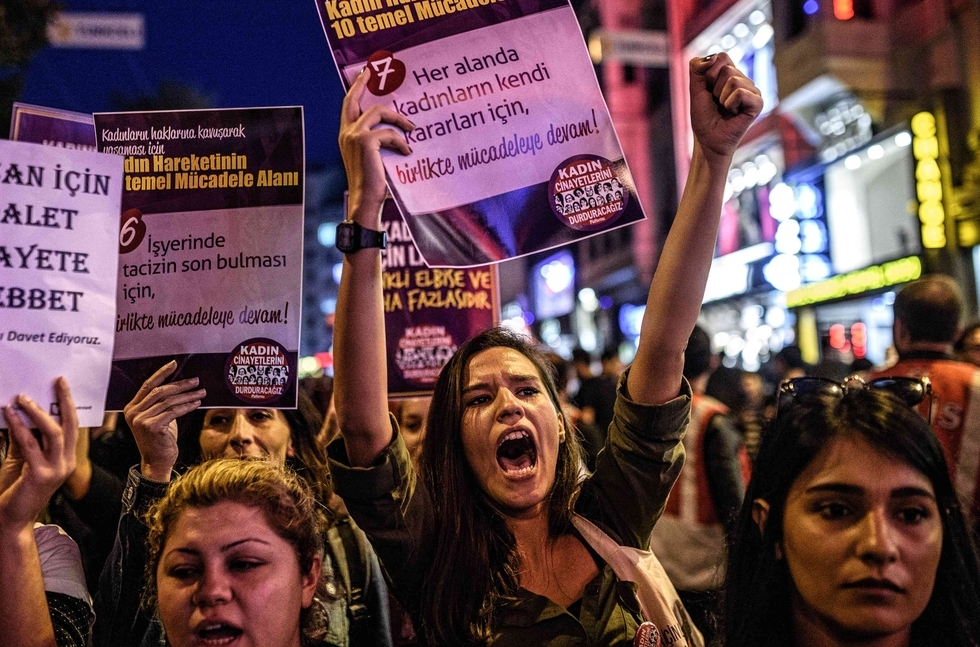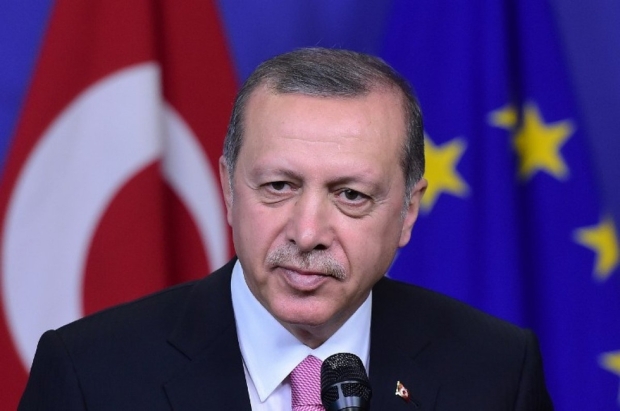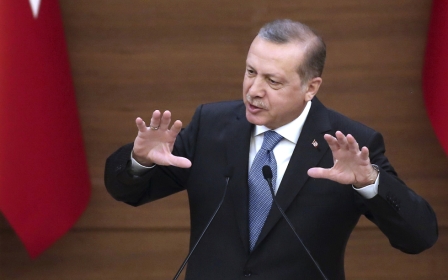Turkey’s deepest divide? It may be the clash over 'lifestyle choice'

ISTANBUL, Turkey – Debate over threats and infringements on peoples’ lifestyle choices in Turkey is not new. But a succession of incidents during the past few months has increased fears that the religious-versus-secular faultline is widening to the point of irreparability.
Attacks on people gathering to listen to rock albums, warnings not to celebrate New Year’s or even attacks on how people dress have left many people on edge.
The divide is perhaps the most dangerous of several in Turkey - yet the country has managed to navigate it one way or the other for much of the past 90 years.
The modern Republic, founded by Mustafa Kemal Ataturk in 1923, was built on the ruins of the collapsed Ottoman Empire, which was also the seat of the Islamic caliphate. Ataturk was determined that modern Turkey would be European and pushed the new republic into adopting western laws and lifestyle.
How the divide evolved - and deepened
But recent events have taken on such proportions that Turkish President Recep Tayyip Erdogan felt the need to address the issue during the regular weekly address he makes to local administrators at the presidential palace.
“Nobody’s lifestyle is under systematic threat in Turkey,” Erdogan said at the palace on 4 January. “I have in the past pointed to some issues I disagree with, but I never used the powers of my office to interfere in anyone’s lifestyle.”
His focus on "lifestyle" indicates that the president felt the need to respond to specific criticism of the president and his party. The debate usually centres on the conservative and religious approach versus a more liberal European mindset. It extends to everything from the role of women and the number of children in a family to the best age to get married and even how to dress.
Historically, the suppression of the lifestyle choices of conservative sections of Turkish society, as well as derision of their beliefs and clothing as being backwards, created a build-up of resentment. It finally found an outlet in 2002, when the conservative Islamist Justice and Development Party (AKP) - of which Erdogan is a co-founder - came to power.
Initially the AKP and its governments spent their energy on correcting those wrongs, a move applauded by the majority of the population. But there was also a debate about rising complaints of “neighbourhood pressure”, or interference in how people behaved towards others in heavily conservative neighbourhoods and the lack of action taken against the offenders.
The divide deepened after 2013 and the Gezi Park protests in support of freedom of speech and other rights, which left the administration rattled.
Santa Claus chased out of town
The government’s critics now accuse officials of often keeping quiet when people or groups not fully aligned with their more conservative worldview are attacked.
Erdogan said in his speech on Tuesday that Turkey was a state of law and that the country’s courts would deal through the justice system with any violation of people’s rights.
READ: Secular feminism is silencing Islamic feminism
But observers point to multiple instances when offenders have been treated lightly, something they regard as politically motivated and a green light for such behaviour. The government insists such claims are untrue and says it cannot interfere in the judicial process.
But cases persist. Aysegul Terzi, a 23-year-old nurse was physically assaulted by a man on a public bus in September for wearing shorts on her way to work. The assailant claimed he was offended by the way she was dressed.
The assailant was repeatedly arrested and released and finally let off by a court. The Ministry of Family and Social Affairs said at the time that it would pursue the case.
In another instance, fans of the band Radiohead were attacked by a mob in Istanbul in June. They had gathered to hear a new album by the band: their attackers take offence at them for listening to music and drinking alcohol during the Muslim holy month of Ramadan.
For the past few years it has become common to see groups trying to dissuade people from celebrating New Year’s Eve, which the protesters say is neither Islamic nor Turkish.
In the past, the methods used were limited to handing out fliers at major junctions in cities or staging dramatic theatricals, during which Santa Claus is chased out of town by people dressed in Ottoman clothing (despite St Nicholas's Turkish origins, he is regarded here as a commercial gimmick associated with New Year).
This year, however, one such stunt had the dressed-up Ottomans pointing a gun at Father Christmas’s head. A public complaint against those involved was dismissed on the basis that it was within their right to free expression.
READ: Secular fanatics and religious police, just let us live our lives in peace
There were also banner headlines in Islamist media that bordered on threats and hate speech warning people who celebrated the New Year of the consequences. One headline read: "Today is the last day. This is the last warning. DO NOT CELEBRATE."
It was also the first time that Turkey’s Directorate of Religious Affairs called in the sermon it prepared for Muslim Friday prayers for people not to celebrate the New Year.
Then there was the mob attack on fashion designer Barbaros Sansal, a fierce critic of the AKP, on 3 January at Istanbul’s Ataturk airport. Concerns were raised about how a mob of baggage handlers was allowed to assault someone airside without official sanction as they disembarked from a plane.
Sansal had been deported from northern Cyprus and was arrested upon arrival in Istanbul for a distasteful video, made in response to the threats telling people not to celebrate New Year. He is accused of insulting the Turkish nation. Erdogan, in his speech on 4 January, condemned such mob behaviour without mentioning the specific incident. He said Turkey was a state of law and people should not try to take matters into their own hands.
Attack on night club draws religious condemnation
The most shocking of incidents, however, was the Islamic State-claimed attack on Istanbul's upscale Reina nightclub in the first few hours of 2017, which left 39 people dead and many more injured.
Mehmet Gormez, the chief of the Directorate of Religious Affairs, was quick to condemn the massacre. "There is no difference whether this barbarous act is committed in a bazaar, a place of worship, or in an entertainment place," he said. “The only thing that differentiates the terrorist action committed tonight from others is that it aims to divide the nation and incite people from different lifestyles.”
Akif Hamzacebi, deputy parliament speaker and MP from the Republican People’s Party (CHP), was one of the first politicians to state that the Reina atrocity was an attack on a lifestyle choice.
But Erdogan lashed out at critics who perceive his government as not condemning IS-perpetrated attacks vociferously or wholeheartedly, saying that his government mourns each attack equally. He even went on to accuse those critics of keeping silent when the same group attacked a wedding ceremony in Gaziantep last August that killed 56 people.
In Tuesday's speech, Erdogan stuck to his oft-repeated line that Turkey is under attack from dark shadowy powers who want to return the country to the shattered state it found itself at the end of WWI.
He said every citizen should adapt their behaviour and remarks by bearing in mind that these attacks sought to make different segments of society fall out and to widen lifestyle-based fault lines.
Yet it is not only the hardcore secular segment of society which is concerned with the growing polarisation and antagonism. Elif Cakir, a journalist and columnist at the Karar newspaper, which represents the moderate voice of the ruling AKP, railed against the government’s displeasure at people calling the Reina atrocity as an attack on lifestyle.
“A lot of us naturally termed the Reina nightclub massacre an attack on a lifestyle choice… because this is Turkey, such things happen… the bruises on Aysegul’s legs for wearing a miniskirt haven’t even cleared up yet…,” she wrote.
READ: The only real choice we can make for Turkey's future
“Even if we might have been early to conclude that it is an attack on lifestyle, it is clear that societal tension is very high and an organisation like the religious affairs directorate needs to be more sensitive…”
In another column, Cakir questioned how come the authorities who were quick to describe terror victims as martyrs refused to do so for the victims of the Reina attack. “Our state leaders, government officials, AK Party politicians are usually quick to arrive at the scene of the incident and immediately issue statements calling the victims martyrs…. But unfortunately the term ‘martyr’ was not used for the Reina victims. They were called innocents, civilians... but nobody called them martyrs…”
Ahmet Hakan, a journalist who worked in the Islamist press for years and in recent times has shifted to the secular Dogan Media Group, wrote in a column that the word secularism used to fill him with loathing - but was now a source of hope.
'Today, libertarian secularism has become the principle to say ‘stop’ to those trying to interfere in lifestyle choices'
- Ahmet Hakan, journalist
“In the past when secularism was mentioned I got upset…because in the past secularism was the flag under which a few gathered who thought it was okay to interfere in the lifestyle choices of others…” he wrote. “These days when secularism is mentioned the image of a port of peace comes to mind… because today, libertarian secularism has become the principle to say ‘stop’ to those trying to interfere in lifestyle choices…”
The fact that almost every one of the 27 tourists killed during the New Year’s Day attack on the Reina nightclub was from an Arabic-speaking country or of Arab descent is a strong indicator of what Turkey represents to many in the Middle East.
They come to enjoy that harmonious mix of an eastern and western lifestyle attained in the 2000s, which few other Middle Eastern countries have managed to achieve, with a pro-Islamist government that can actually work and be successful. This is why Turkey was cited as a potential role model for Middle Eastern states during the early days of the Arab Spring.
Middle East Eye propose une couverture et une analyse indépendantes et incomparables du Moyen-Orient, de l’Afrique du Nord et d’autres régions du monde. Pour en savoir plus sur la reprise de ce contenu et les frais qui s’appliquent, veuillez remplir ce formulaire [en anglais]. Pour en savoir plus sur MEE, cliquez ici [en anglais].







